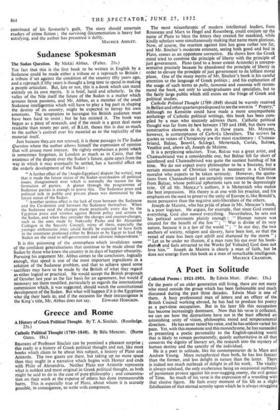Greece and Rome
A History of Greek Political Thought. By T. A. Sinclair. (Routledge. 25s.) Catholic Political Thought (1789-1848). By Bela Menczer. (Burns Oates. 18s.) READERS of Professor Sinclair can be promised a pleasant surprise ; this really is a history of Greek political thought and not, like most books which claim to be about this subject, a history of Plato and Aristotle. The two giants are there, but taking up no more space than they ought in a narrative which begins with Homer and ends with Philo of Alexandria. Neither Plato nor Aristotle represents what is noblest and most original in Greek political thought, as both might be said to do in the case of puroThilosophy ; and concentra- tion on their work at the expense of others has done immeasurable harm. This is especially true of Plato, about whom it is scarcely possible, in consequence, to write with composure.
The most misanthropic of modern intellectual leaders, from Rousseau and Marx to Hegel and Rosenberg,, could conjure up the name of Plato to bless the fetters they created for mankind, while kindly scholars were simultaneously making that name more glorious. Now, of course, the reaction against him has gone rather too far, and Mr. Sinclair's moderate estimate, seeing both good and bad in Plato, comes as an opportune corrective. He shows how the Greek mind tried to combine the principle of liberty with the principle of just government. Plato (and to a lesser extent Aristotle) is unrepre- sentative precisely because he abandoned the principle of liberty in order to elevate the principle of just government to its loftiest moral plane. One of the many merits of Mr. Sinclair's book is his careful attention to the language of Greek politics ; and his explanation of the usage of such terms as polls, isonomia and eunomia- will recom- mend the book, not only to undergraduates and specialists, but to the fairly large public which still exists on the fringe of Greek and political studies.
Catholic Political Thought (1789-1848) should be warmly received in Belfast and other quarters predisposed to see the worst in " Popery." Although no Kensitite could have made a more unsympathetic anthology of Catholic political writings, this book has been com- piled by a man who sincerely admires them. Catholic political thought was far from its best between 1789 and 1848, but there were constructive elements in it, even in those years. Mr. Menczer, however, is contemptuous of Cathnl:c liberalism. The writers he quotes as voices of Christianity are the most reactionary : Chateau- briand, Balzac, Bons1.1, Schlegel, Metternich, Cortes, Balmes, Veuillot and, above all, Joseph de Maistre.
It is a perplexing selection. True, Balzac was a great artist, and Chateaubriand was a considerable one, but Balzac fell far short of sainthood and Chateaubriand was quite the nastiest humbug of his time. We do not expect every philosopher to be a Socrates, but a certain minimum of Christian virtue is necessary in a Christian moralist who expects to be taken seriously. However, the quota- tions from Chateaubrianri are certainly more interesting than those from Balzac, whose polit;cal aphorisms turn out to be depressingly trite. Of all Mr. Menczer's authors, it is Metternich, who makes the best impression. His theory is at one with his practice, and his emphasis on the need to preserve the unity of Europe is, like Bonald's, more persuasive than the negative anti-liberalism of the others. • Joseph de Maistre, who has pride of place in Mr. Menczer's book, is a poor logician. He argues, for example, that since God created everything, God also named everything. Nevertheless, he sets out his political sentiments plainly enough : " Human nature was created for the benefit of the few " ; " War is divine of its very nature, because it is a law of the world " ; " In our day, the two anchors of society, religion and slavery, have been lost, so that the vessel of state has been cast adrift and shattered by the storm " " Let us be under no illusion, if a man runs his eye over his book- shelve* and feels attracted to the Works [of Voltaire] God does not love him." Joseph de Maistre is clearly a man of faith, but he does not emerge from this book as a man of remarkable intelligence.
MAURICE CRANSTON.


































 Previous page
Previous page